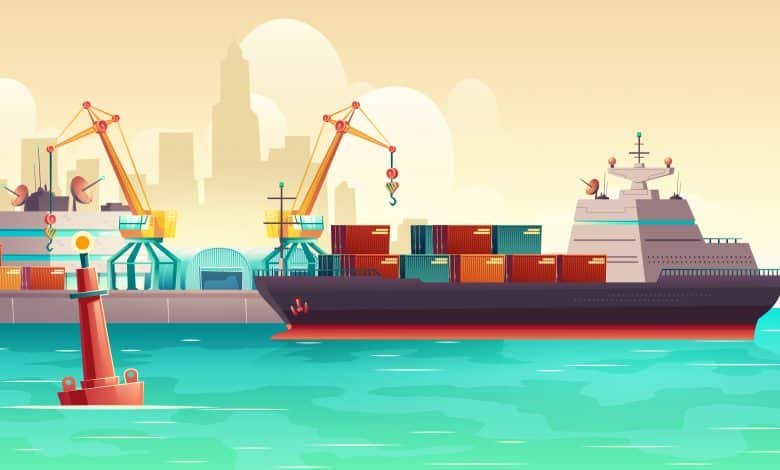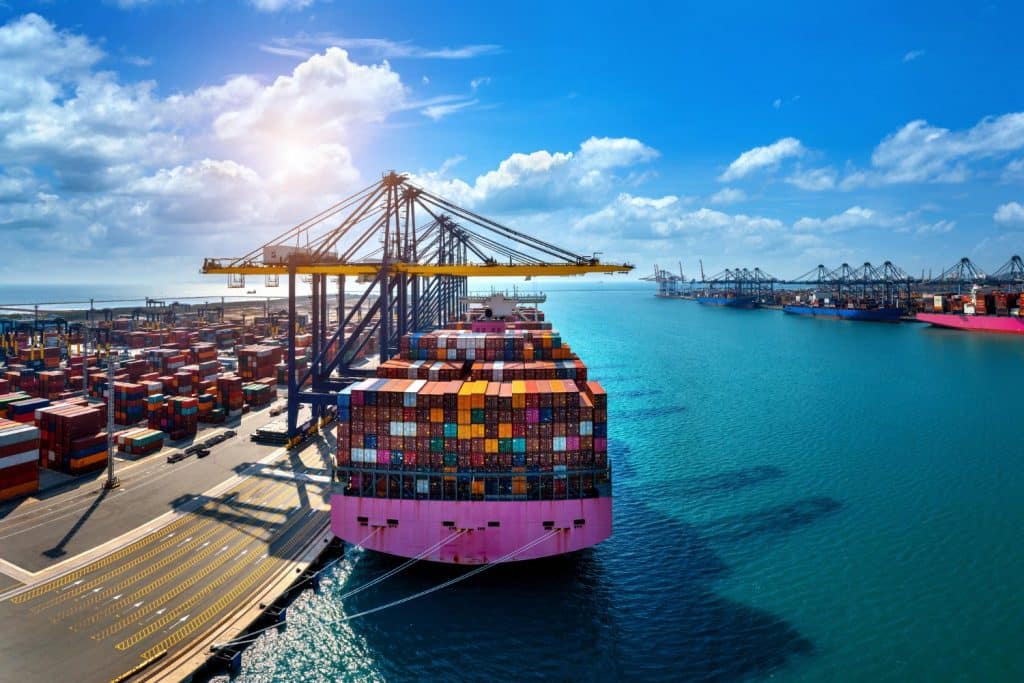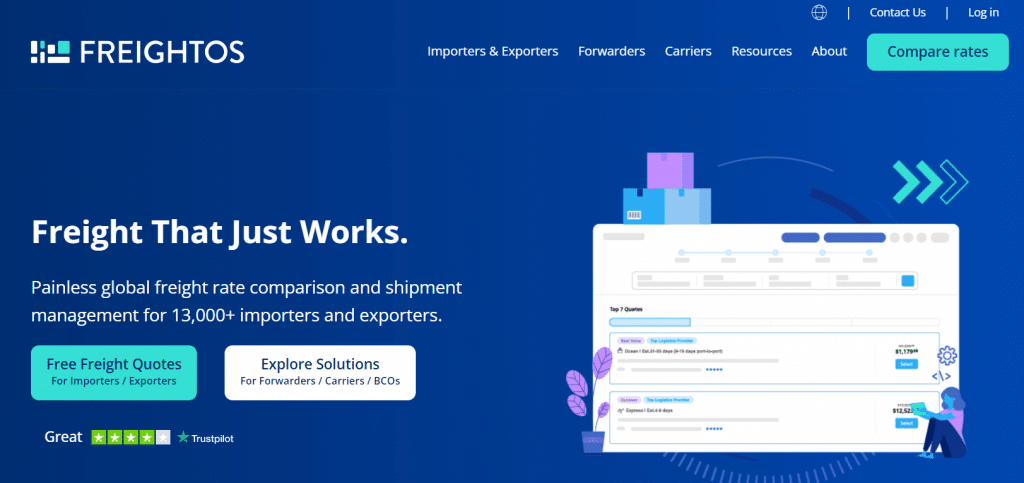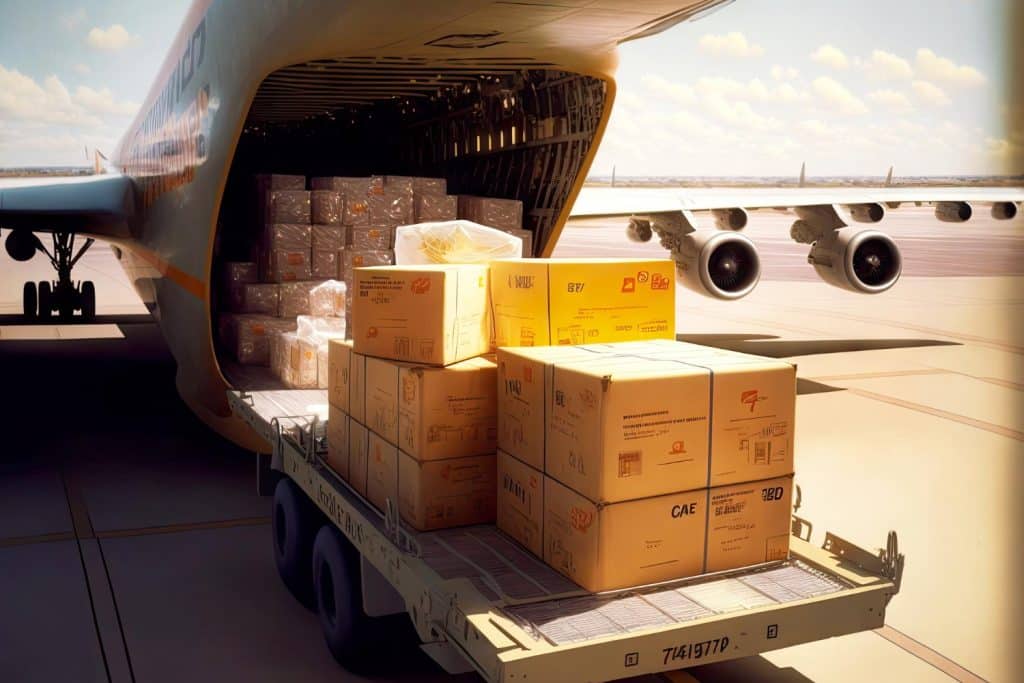7 Best Digital Freight Forwarding Companies to Expand Your Ecommerce Business’s Global Reach

Freight forwarding can be the key to expanding your ecommerce business.
Predicted to reach a value of $285.15 billion by 2031, the global freight forwarding market is transforming the way companies and consumers access goods around the world. With the right freight forwarding solution, ecommerce vendors can connect with consumers in new countries, expand their revenue, and outshine the competition.
But finding the right freight forwarding service isn’t always easy. There are countless freight forwarding companies out there, all promising to help bridge the gaps between your company and your warehouses, buyers, and end-users.
The challenge is first understanding what a freight forwarder is, when it’s needed (if at all), and figuring out which freight forwarder you should be working with. This guide will explain freight forwarding from A to Z and will offer 7 of our top recommendations for digital freight forwarding companies you can partner with to expand your business’s global reach.
What Is Freight Forwarding?
Let’s start with the basics. Freight forwarding is a core component in the logistics process for many ecommerce businesses, but it’s something a lot of sellers still don’t fully understand.

As opposed to third-party logistics companies (3PL) or fulfillment solutions, freight forwarding companies don’t deliver shipments to end customers and they don’t fulfill orders themselves. Rather, they act as middlemen between the retailer making a shipment (you), and various third parties that receive and tend to the shipment along the supply chain.
For example, freight forwarders can move goods from a manufacturing facility to a warehouse or fulfillment center, whether it’s across air, land, or sea. They also help streamline the process by taking care of all sorts of paperwork, helping with customs clearance, industry documentation such as bills of lading, and international regulations such as Incoterms.
Accordingly, freight forwarders are relationship experts that leverage their trusted connections with global carriers and partners to ensure you can send your products anywhere. Freight forwarders work with trucking companies, air transport specialists, and even transoceanic lines to give you a variety of supply chain options.
Plus, their existing partnerships with these third parties often mean that ecommerce brands can benefit from preferred shipping rates and hefty discounts, otherwise unattainable if you’re working solo.
While freight forwarding is nothing new, the market has grown astronomically in recent years thanks to the evolution of the ecommerce space. As such, it's little wonder that countless freight forwarding companies have emerged over the years to grab their share of this lucrative market.
However, the increasing number of freight forwarding companies worldwide can make choosing the ideal partner a lot more complex. But before we dive into those considerations and our top recommendations, it’s important to fully grasp the role freight forwarding companies play with respect to other players in the space such as 3PL companies, freight marketplaces, and shipping and fulfillment solutions.
Freight Forwarders vs. Freight Marketplaces
One of the things that makes understanding the freight forwarding space so confusing is the amount of overlapping and similar services that exist in the logistics landscape. For instance, you might think that freight forwarders and freight marketplaces are the same thing.
However, freight marketplaces, such as Freightos, offer direct access to a range of transportation companies you can use to transport goods around the world. Depending on the marketplace you choose, features can include everything from shipment tracking to automated cargo documentation, carrier selection, and freight quote comparison tools.

Essentially, freight marketplaces offer a way for shippers (retailers, business owners, etc.), to self-manage their entire shipment process and potentially save costs on intermediaries. The online platforms enable shippers to explore logistics service providers such as air, ocean, and land carriers, freight forwarders, 3PLs, custom brokers, consolidators, and other types of intermediaries along the supply chain.
In this sense, freight marketplaces allow companies to sort through a wide range of different carriers and solutions and can also offer some of the same services as digital freight forwarding companies, such as automated booking and tracking of shipments.
However, the self-service nature of freight marketplaces can daunt sellers with too many options. Additionally, freight marketplaces don’t always offer the same level of customer support and guidance as you’ll get from a freight forwarder.
Freight Forwarders vs. Third-Party Logistics Companies (3PL)
Similarly, freight forwarders are sometimes confused with 3PL companies. Once again, both of these organizations can help you expand your ecommerce business worldwide, but their service offerings are a little different.
A freight forwarder is a specialist that partners with other companies to ensure goods are securely and rapidly moved between locations. A 3PL, on the other hand, is a specialist that integrates warehousing operations and transportation services, handling all sorts of logistics needs such as moving products, insuring items, and dealing with warehouse preparation.
Essentially, a 3PL is more involved in the logistics process with your business, including delivering to the end customer. 3PL companies play a significant role in helping you prepare your products when an order is placed.
3PL companies also encompass order fulfillment, making them an attractive option for ecommerce sellers looking to outsource their end-to-end delivery process, such as first and last mile delivery. ShipBob, for example, is an industry leader that supports companies throughout various stages of the fulfillment and delivery process.
3PL companies also specialize in managing inventory, such as organizing and packaging goods to be shipped overseas. They can also offer access to warehousing locations so you can move products closer to your intended customers. However, while they do accommodate international shipping by often working with freight forwarders, fulfillment providers aren’t exactly the same as freight forwarding companies.
Freight forwarders focus on getting your goods from one point to another, such as from your initial warehouse, to a warehouse in another part of the world. Fulfillment companies focus more on managing warehouse processes and packaging items for shipment.
Deciding which service is right for your business depends on your needs. Some businesses are more independent, capable of managing logistics and delivery services themselves, or they might be located near a port, which in this case, they might only need to work with a freight forwarder. Other businesses might not have the resources for this or could be landlocked, and would therefore benefit from full-service providers such as 3PL companies.
The Different Types of Freight Forwarding Companies
Freight forwarding companies, like many logistics and B2B brands, come in a variety of shapes and sizes. Way back in the 1800s, some of the first “freight forwarders” were innkeepers who helped hotel guests forward their goods to other locations with the help of delivery teams.
Fast-forward to now, and freight forwarding companies are usually defined by a few things: their transportation options (via partnerships), their level of service, and the tools they offer.
Some of the most common types of freight forwarders include:
- Air transportation forwarders: Air freight forwarding vendors focus heavily on relationships with companies that transport goods through planes. They offer businesses one of the fastest modes of transportation for their goods, making them ideal for companies with goods that are perishable, but they’re also the most expensive.
- Sea freight forwarders: One of the most traditional forms of international freight forwarding is via the oceans, in which sea freight forwarders work with transoceanic companies to transport goods via ocean vessels. They offer a range of FCL (Full-container load) and LCL (Less-than container load) container shipping options, designed to suit businesses of all sizes. Plus, they can deliver goods to various ports all over the globe.
- Road freight forwarders: Road freight forwarders work alongside trucking companies and other road-based brands to deliver goods “by land”. They’re one of the most popular options for companies who need to transport goods in the same country or general location. Road freight forwarders handle everything from route planning to cargo tracking.
- Multi-modal freight forwarders: Increasingly common in today’s world, multi-modal freight forwarders partner with a range of delivery companies, operating through the sea, air, land, and even rail lines. They ensure companies can access the cheapest, fastest, and most efficient form of transport for every shipment.
Differences Between Digital and Traditional Freight Forwarders
Aside from distinguishing freight forwarding companies by the types of transportation they offer, we can also differentiate these brands based on their “traditional” or “digital” approaches to business. The freight forwarding industry, as old as it is, still encompasses a wide range of companies that rely on manual processes, but there are also those that have embraced digital transformation.
A traditional freight forwarding company relies heavily on more old-fashioned processes, such as filling out paperwork manually, managing multiple communication channels, manual order tracking, and physical payment methods. Though this form of freight forwarding is still common, it’s becoming less attractive in the digital world, where speed, visibility, and efficiency are crucial.
Digital freight forwarding companies are essentially traditional brands that have digitally transformed with the implementation of new tools and technologies. They use automation for real-time order tracking and managing online shipping payments, offer access to online platforms for processing shipping requests, and essentially make the freight forwarding process a lot simpler.
Currently, the market for digital freight forwarding is growing at a rate of around 23.1%, and is set to reach a value of over $22.92 billion by 2030. This is an indication of how popular digital freight forwarding platforms are becoming.
Compared to traditional solutions, digital freight forwarding companies offer a host of unique benefits such as instant shipping quotes, online booking tools, real-time tracking, online checkouts, and even access to bonus services, such as financing.
The Unique Benefits of Freight Forwarding Companies
Regardless of what type of freight forwarding company you choose, all of these organizations can deliver incredible benefits to ecommerce brands.
One of the most attractive qualities freight forwarders have is their knack for being personal and trustworthy. You can expect more of a “home” service and personal touch from freight forwarders, which are often smaller companies compared to some of the larger 3PLs. Freight forwarders pride themselves in being a true partner to all types of brands, looking out for their best interests, similar to a travel agent.
While you can always try to form relationships with transportation companies yourself, using a freight forwarder gives you unique access to:
- Experience and accountability: Moving goods internationally isn’t an easy task. There are plenty of challenges to overcome, from ensuring customs forms are properly filled out, to choosing the right container and transportation methods for goods. A professional freight forwarder can use their experience to ensure you plan the most straightforward and reliable strategy for getting your goods to wherever they need to be.
- A vast partner network: Trust us, building partnerships with transportation companies is hard. Many major vendors won’t even consider working with smaller brands. However, they will work with a reputable freight forwarder. Freight forwarding companies provide access to a global network of companies you can work with to power your supply chain. They work alongside ground handlers, carriers, warehouse operators, financial brokers, logistics services, and more, giving you direct access to all the support you need.
- Improved compliance: How much do you really know about the laws and regulations of every country you ship products to? The chances are, it’s not nearly as much as your freight forwarder knows. Freight forwarding companies can help you maintain compliance by helping with bills of lading, documentation, Incoterms, HS codes, letters of credit, customs declarations and so much more.
- Intuitive technology: Many modern freight forwarding companies, such as digital freight forwarders, offer access to valuable technology that can improve your customer service and shipping strategy. They offer access to real-time tracking tools, so you can monitor where your orders are at any given time and share feedback with customers. They can also offer automated tools to help streamline your ordering and booking processes.
- Reduced costs: Freight forwarding companies work with a variety of different brands and shippers. They can negotiate excellent rates with the partners they work with because they provide them with a significant volume of work. That’s what they call “economies of scale”. While booking shipments on your own can be extremely expensive, the right freight forwarder can save you significant time and money. Some can even help you choose the most cost-effective routes and transportation methods for each delivery.
- Versatility: Freight forwarders are experts in navigating the various complexities of the logistics industry. They can guide you in the right direction regardless of what your logistics and shipping needs might be. If you need to change your strategy or access more support, freight forwarders can adapt with you. Some companies can even help you scale faster by offering access to financing and buy-now-pay-later services.
What to Consider When Choosing a Freight Forwarder
So, how do you choose a freight forwarder you can trust?
First and foremost, you’re going to need to figure out what kind of freight forwarding service you need. For ecommerce companies, the best option is usually to choose a multi-modal freight forwarding company that offers a variety of transportation methods.
This ensures you can get the best deals on your forwarding requests, regardless of whether you’re shipping large orders to warehouses or smaller orders to customers. Choosing a digital freight forwarder can also make your life a lot easier by reducing the amount of paperwork you need to do and by automating common processes.
Other factors you’ll need to think about include:
- Experience and expertise
Probably the most important factor to consider when choosing freight forwarding companies to work with is their experience and expertise. Search for a company that has an exceptional track record working with ecommerce brands in your industry.
Remember, different industries have different requirements when it comes to shipping. If you’re selling food and beverages, for instance, you’ll need to ensure you work with a freight forwarder who knows how to protect your cargo and get it through customs checks.
An experienced freight forwarder with expertise in your industry will be able to ensure your shipments are handled safely and efficiently.
- A wide network of partners
Freight forwarders are middlemen in the logistics journey. That means they’re only as good as their partners. If you want to ship products to specific regions worldwide, you’ll need to make sure your freight forwarder has partners in those areas.

Check that the company has an extensive network of contacts and connections to take advantage of so you’ll have plenty of options for routing and delivery. It’s also worth making sure the relationships your freight forwarders have with their partners is strong. This can reduce the risk of shipment delays and unexpected changes in shipping costs.
Most leading freight forwarders will be able to give you behind-the-scenes insights into the partners they work with, the services they offer, and the areas they serve.
- Range of services
Sure, freight forwarders help your products get from A to B, but that’s not all they can do. They can also work as valuable partners throughout your logistics process, helping with everything from documentation to customs processing.
Some freight forwarding companies offer more services than others. There are businesses that provide full door-to-door shipping solutions, so you don’t have to worry about working with additional third parties. Others can offer access to shipping insurance providers to protect your cargo.
There are even freight forwarders who can assist you in scaling your ecommerce business, by offering access to funding or new travel routes.
- Reputation and customer satisfaction
You wouldn’t choose a new accounting software or ecommerce platform provider without checking out its reputation first. The same rule applies to choosing the right freight forwarding companies. We’d recommend being wary of any business that doesn’t share a lot of information or reviews online. Don’t just check the reviews and case studies on a company’s website either.
Rather, make sure you’re getting an objective insight into the service and support you can expect by examining Google reviews, TrustPilot ratings, and other credentials. The ideal company should have a great track record of delivering exceptional service to each ecommerce brand it has worked with.
It can be helpful to look at the registrations and certifications of the business, too. If a company is certified by specific companies or has earned awards for its service, that’s usually a pretty good sign.
- Ease of use and support
Freight forwarding companies are there to make the process of expanding your ecommerce business easier – not harder. The whole point of working with one of these companies is so that they can take over the challenging parts of your shipping process so you can focus on other things.
Whether you choose a digital freight forwarder or traditional company, you should make sure their services are easy to access. Choose a company that makes it simple to track your orders, find the best shipping rates, and book deliveries at the time that suits you.
Most importantly, ensure their customer support strategy is up to scratch. Many leading vendors will offer 24/7 support through phone calls, email, and chat. Some can even give you dedicated training and onboarding sessions to help you set up new software.
- Value and cost
While it’s tempting to focus only on the monthly cost or fees charged by your freight forwarder, remember to think about the big picture. The cheapest option won’t always be the best. In fact, cutting corners with your service could mean you lose money in the long term.
If you can’t trust your freight forwarder to deliver an exceptional service, you also can’t deliver products quickly and efficiently to your customers. That’s where turnover often starts in the commerce industry.
With that in mind, make sure you compare the total cost of your freight forwarding company with the potential ROI gained from using its service.
The 7 Best Digital Freight Forwarders for Ecommerce Businesses
Now that you know everything there is to know about freight forwarding, it’s time to start evaluating our top recommendations on the market. Since filtering through endless freight forwarding brands can be a time-consuming process, we’ve done the hard work for you.
We’ve assessed the services and value offered by some of the top-rated digital freight forwarding companies on the modern market. Here are our top picks.
An innovator in the world of digital freight forwarding and supply chain management, Flexport promises to make your logistics journey easier than ever. The company offers access to an end-to-end, AI-fuelled technology platform that simplifies workflows, helps you coordinate various aspects of your business, and ensures you can make intelligent decisions with analytics.
Flexport streamlines various parts of the supply chain and serves more than 10,000 brands worldwide with a global network of partners. It offers dedicated solutions for ecommerce brands, trade advisory services, working capital, and more. Plus, it offers air, truck, and ocean freight options.
You can even use the Flexport platform to access cargo insurance, manage your orders, and deal with customs. Plus, there’s a handy tool to help you track and reduce your carbon emissions, so that’s a great thing if you want to build a greener company.
Notably, Flexport can also offer a range of other fulfillment services, such as replenishment, parcel management, warehouse prepping, D2C shipping, and wholesale fulfillment.
Ship4wd is a digital freight forwarding platform exclusively created to solve the shipping needs of small to mid-sized businesses (SMBs). Established by ZIM, a publicly held international cargo shipping company and one of the top 20 shipping carriers in the world, Ship4wd leverages ZIM’s vast network of partners and benefits from its 78 years of industry experience and connections.
Because of this, Ship4wd has a unique ability to represent SMBs in the international freight arena, securing them affordable prices (usually only reserved for larger companies) and guaranteeing container allocation, which can be a major challenge for smaller businesses. Its transport network spans over 500 nodes around the world, specializing in North America and Asia.
Ship4wd’s digital freight forwarding platform offers access to instant quotes, real-time order tracking, secure online checkout, and 24/7 customer support (from actual human beings), as well as cargo insurance and customs brokerage.
In line with its mission to represent SMBs, Ship4wd offers a range of financing solutions such as instant credit lines, flexible repayment terms, and buy-now-pay-later options to help SMBs maintain a healthy cash flow, widely considered to be one of the top challenges to SMB growth.
The company is led by a leadership team with decades of industry experience, delivering specialist solutions to various brands including ecommerce, retail, wholesale, and much more. In 2023, Ship4wd was named the best freight forwarder for SMBs in the US and Canada by Global Brands Magazine.
Saloodo is a digital logistics company specializing in full-load and part-load shipping, as well as general cargo shipping. The company operates as both an online freight exchange and digital freight forwarder. This basically means you get the freedom of a freight marketplace, and the support of a dedicated freight forwarder at the same time.
For ecommerce companies, Saloodo offers access to a free company account, an extensive carrier network, and tools for digital invoice creation. The comprehensive toolkit includes access to document upload tools, browser alerts, dashboard notifications, tracking and tracing tools and more. You can also access a smart shipment wizard for quick insights into delivery options.
Plus, the digital platform provides businesses with a single point of contact for all their shipping needs, paperless documentation, live transport tracking, and an all-in-one address book. One of the great things about Saloodo is its excellent customer service. You can even access assistance with transport requests and leverage instant transport offers.
Promising to make freight “radically simple”, Spotos is a digital freight forwarding solution with an intuitive platform for business leaders. The easy-to-use backend makes it simple to track all of your freight and orders in one convenient location. Plus, there’s a handy tool for tracking down the best deal on your freight needs, so you can save up to 30% on shipping costs.
The company has a carrier network of over 50,000 trucks and focuses mainly on domestic shipping. What’s more, it works only with verified carriers, so you can rest assured your cargo will be protected at all stages of the logistic journey.
Spotos offers instant freight rate estimations, helps you pay carriers directly, and even offers freight insurance and claims management for extra peace of mind. The real-time dashboard is particularly useful for ensuring you can keep your customers up to date on where their orders are. Plus, there are no subscription costs or hidden fees for the service.
However, it is worth noting that most of Spotos’ customer service options are self-service, although you can reach out through live chat and email.
Spanish freight forwarding company Nowports is an expert in centralizing international trade operations for businesses of all sizes. The digital freight forwarding company promises to manage cargo transportation from end-to-end with a logistics solution that adapts to your specific needs.
You can choose between sea, air, and land transportation, opt for containers, pallets, or boxes, and even add different multimodal shipment strategies into the mix. Plus, Nowports also handles a variety of Incoterms and offers additional services to help you store and protect your merchandise.
Like many leading digital freight forwarding companies, Nowports includes access to real-time tracking so you can see the status of your orders at all times. The company creates automatic reports based on your needs and has offices in regions all over the world for instant human support.
Plus, Nowports is home to more than 900 logistics, finance, and technology experts who can work one-on-one with your business to develop the ideal strategy.
Versatile logistics provider Zencargo is an award-winning brand offering expert freight management and forwarding. Unlike some freight companies, Zencargo promises to work with your organization, adding their logistics experts to your team to identify areas for improvement.
The global freight forwarding service offered by Zencargo is digitized, giving you a comprehensive platform where you can manage orders, routes, and partners. You can also choose between sea, air, and road freight depending on your needs thanks to a global network of partners.
Zencargo also promises to only charge companies for the volume they ship thanks to its LCL service. Companies can use the platform to access in-depth analytics, plan their cargo movements in advance, and even use real-time data to find the best routes.
The brand also has a dedicated customer success team available, so if you do have any issues with your service, you can access rapid support.
All-in-one digital freight forwarding platform MyCeva empowers businesses to manage their shipment and fulfillment strategy from anywhere. You can choose between ocean, air, and sea freight options, thanks to MyCeva’s global network of reliable partners.
There’s also the option to request “premium” shipping services to ensure items are transported as quickly as possible. MyCeva has 14 global hubs and covers over 600 shipping routes worldwide. Plus, it’s one of the few companies fully committed to eco-friendly shipping.
The website even has a carbon footprint calculator where you can track your potential emissions and find new ways of reducing them. MyCeva customers benefit from one-click booking options, real-time monitoring of all shipments, and customizable quotes based on their unique needs.
You can also rest assured that you’ll be able to see all of your shipments and documents in one place, making compliance and planning a lot easier. The company also promises excellent customer support, from onboarding assistance to real-time phone and chat guidance.
Choosing the Right Digital Freight Forwarding Company
Choosing the right digital freight forwarding company for your ecommerce businesses can seem like a daunting prospect. There are so many different vendors on the market, all promising to offer the best rates and the most intuitive services. However, there are some options that stand above the crowd. At the end of the day, it’s about finding a partner you trust and one that meets your business’s needs.
With a freight forwarding partner, you’ll be able to access powerful digital tools that streamline your logistics processes and pave the way for global growth. Whether you’re focusing on delivering exceptional service to your customers or you just want to expand into new regions, partnering with a digital freight forwarder will help you achieve your goals.




